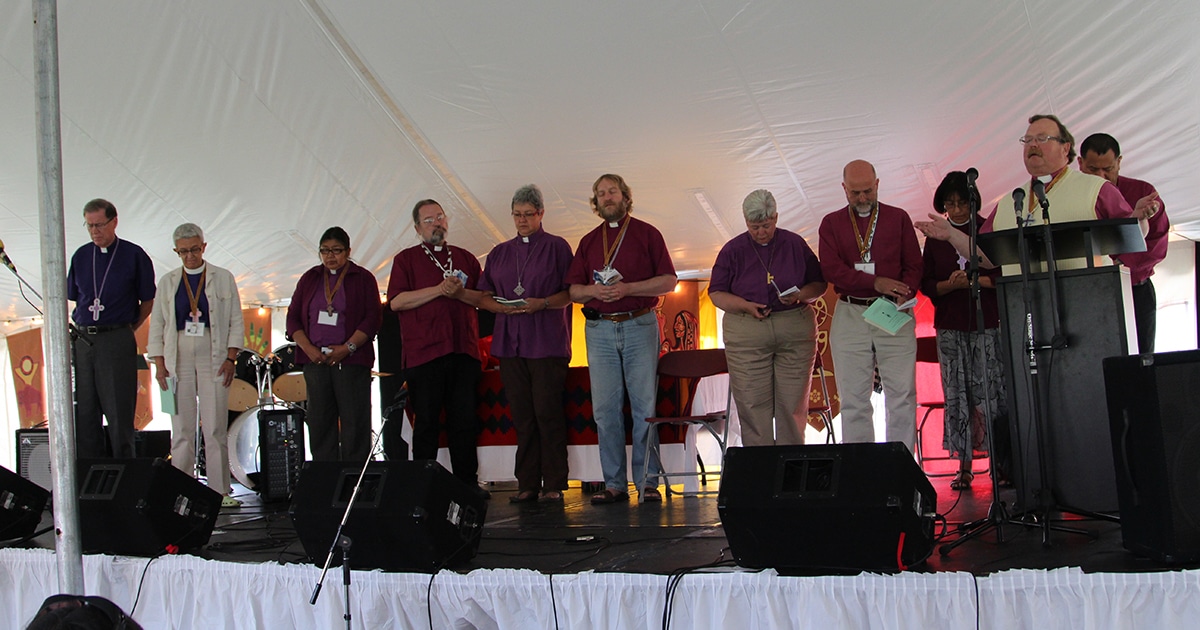Progress that has been made by Indigenous Anglicans towards self-determination will be evident by the very nature of the discussion when the eighth national Anglican Indigenous Sacred Circle meets later in August.
“The next phase of self-determination will be the heart and focus of it,” National Indigenous Anglican Bishop Mark MacDonald said of the meeting, which is scheduled to take place from August 16-22 at the UNIFOR Family Education Centre in Port Elgin, Ont.
Representative of accomplishments thus far was the adoption at the 2013 General Synod of Canon XXII, which formalized the incorporation of the Sacred Circle into the larger structure of the Anglican Church of Canada.
If substantial progress has been made, those achievements are in no small part due to the influence of the Sacred Circle itself—the national gathering and decision-making body for Indigenous Anglicans in Canada.
Taking place every three years, Sacred Circle serves as an opportunity for First Nations, Inuit and Métis church members to come together in prayer with the Anglican Council of Indigenous Peoples (ACIP)—along with the Primate and twelve non-Indigenous church leaders—to talk about their concerns and priorities as Indigenous Anglicans, and to make plans and prepare statements for the wider church.
The first meeting, which took place in 1988 in Fort Qu’Appelle, Sask., followed increasing calls for such a gathering in light of various issues affecting Indigenous Anglicans, such as the health and vitality of Indigenous congregations, urban ministry, the emerging environmental crisis and the truth about residential schools, which also affected the church as a whole.
In the 27 years since, Sacred Circle has been the site of numerous historic developments, including the 1993 apology by Archbishop Michael Peers for the church’s role in administering the Indian residential schools, the development of the 1994 Covenant calling for a new relationship with the church based on self-determination, and the creation of the position of National Indigenous Anglican Bishop.
Sacred Circle, said Bishop MacDonald, “has been the catalyst for just about everything that’s happened.”
“Although it reflects things that are going on in the local communities,” he added, “when it comes together it focuses it and allows that energy to be dispersed creatively throughout the network of Indigenous congregations.”
Approximately 160 people are expected to attend this year’s Sacred Circle, with a broad cross-section of delegates including clergy, lay leaders, elders and young people. Indigenous guests from other countries will include a Sami guest from Sweden and a Maori guest from New Zealand.
Along with adapting to the changes created as a result of Canon XXII, the meeting will include discussion of the statement Where We Are Today: Twenty Years after the Covenant, an Indigenous Call to the Wider Church, how to respond to the final report of the Truth and Reconciliation Commission and its 94 calls to action, reports from various committees, and the election of new ACIP members.
Currently, each of the four ecclesiastical provinces has two representatives on ACIP, which Indigenous Ministries Coordinator, the Rev. Canon Ginny Doctor said may come up for debate.
“A place like Rupert’s Land has tons of Indigenous ministry, but still they only get two [representatives]—and a place like the Arctic, although it’s huge in terms of land mass, population-wise it’s not that big and they get two,” Doctor said. “So we’re going to play with that and see if we can make some adjustments to have a more fair representation.”
A new development this year, she noted, will be two occasions for learning circles which will include workshops on climate change, Indigenous catechist training, urban ministry, and models for suicide prevention.
“We’re really trying to highlight a lot of the good work that’s being done.”
Interested in keeping up-to-date on news, opinion, events and resources from the Anglican Church of Canada? Sign up for our email alerts .

